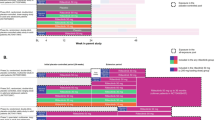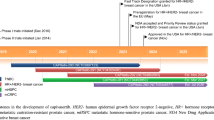Summary
Background PBI-05204, a Nerium oleander extract (NOE) containing the cardiac glycoside oleandrin, inhibits the α-3 subunit of Na-K ATPase, as well as FGF-2 export, Akt and p70S6K, hence attenuating mTOR activity. This first-in-human study determined the safety, pharmacokinetics (PK) and pharmacodynamics (PD) of PBI-05204 in patients with advanced cancer. Methods Forty-six patients received PBI-05204 by mouth for 21 of 28 days (3 + 3 trial design). Dose was escalated 100 % using an accelerated titration design until grade 2 toxicity was observed. Plasma PK and mTOR effector (p70S6K and pS6) protein expressions were evaluated. Results Dose-limiting toxicities (grade 3 proteinuria, fatigue) were observed at dose level 8 (0.3383 mg/kg/day). Common possible drug-related adverse were fatigue (26 patients, 56.5 %), nausea (19 patients, 41.3 %) and diarrhea (15 patients, 32.6 %). Electrocardiogram monitoring revealed grade 1 atrioventricular block (N = 10 patients) and grade 2 supraventricular tachycardia (N = 1). The MTD was DL7 (0.2255 mg/kg) where no toxicity of grade ≥ 3 was observed in seven patients treated. Seven patients (15 %) had stable disease > 4 months. Mean peak oleandrin concentrations up to 2 ng/mL were achieved, with area under the curves 6.6 to 25.5 μg/L*hr and a half-life range of 5–13 h. There was an average 10 % and 35 % reduction in the phosphorylation of Akt and pS6 in PBMC samples in 36 and 32 patients, respectively, tested between predose and 21 days of treatment. Conclusions PBI-05204 was well tolerated in heavily pretreated patients with advanced solid tumors. The recommended Phase II dose is 0.2255 mg/kg/day.



Similar content being viewed by others
References
Johansson S, Lindholm P, Gullbo J, Larsson R, Bohlin L, Claeson P (2001) Cytotoxicity of digoxin and related cardiac glycosides in human tumor cells. Anticancer Drugs 12:475–483
Frese S, Free-Schaper M, Andres AC, Miescher D, Zumkehr B, Schmid RA (2006) Cardia glycosides initiate Apo2L/TRAIL-induced apoptosis in non-small cell lung cancer cells by up-regulation of death receptors 4 and 5. Cancer Res 66(11):5867–5874
Nasu S, Milas L, Kawabe S, Raju U, Newman RA (2002) Enhancement of radiotherapy by oleandrin is a caspase-3 dependent process. Cancer Lett 185:145–151
McConkey DJ, Lin Y, Nutt LK, Ozel HZ, Newman RA (2000) Cardiac glycosides stimulate Ca increases and apoptosis in androgen-independent, metastatic human prostate adenocarcinoma cells. Cancer Res 60(14):3807–3812
Stenkvist B, Benatsson E, Eklund G et al (1980) Evidence of a modifying effect of heart glycosides on the development of breast cancer. Anal Quant Cytol Histol 2:49–54
Haux J (1999) Digitoxin is a potential anticancer agent for several types of cancer. Med Hypotheses 53(6):543–548
Stenkvist B (1999) Is digitalis a therapy for breast carcinoma? Oncol Rep 6:493–496
Smith JA, Madden T, Vijjeswarapu M, Newman RA (2001) Inhibition of export of FGF-2 from the prostate cancer cell lines PC3 and DU 145 by Anvirzel and its cardiac glycoside component oleandrin. Biochem. Pharmacol. 62(4): 469–472.
Manna SK, Sah NK, Newman RA, Cisneros A, Aggarwal BB (2000) Oleandrin suppresses activation of nuclear transcription factor- kB, activator protein-1 and c-Jun NH2-terminal kinase. Cancer Res 60:3838–3847
Newman R, Yang P, Pawlus A, Block K (2008) Cardiac glycosides as novel cancer therapeutic agents. Mol Interv 8(1):36–49. doi:10.1124/mi.8.1.8
Newman RA, Kondo Y, Yokoyama T, Dixon S, Cartwright C, Chan D, Johansen M, Yang P (2007) Autophagic cell death of human pancreatic tumor cells mediated by oleandrin, a lipid-soluble cardiac glycoside. Integr Cancer Ther 6:354–364
Sreenivason Y, Raghavendra PB, Manna SK (2006) Oleandrin-mediated expression of Fas potentiates apoptosis in tumor cells. J Clin Immunol 26(4):308–322
Raghavendra PB, Sreenivasan Y, Manna SK (2007) Oleandrin induces apoptosis in human, but not in murine cells: dephosphorylation of Akt, expression of FasL, and alteration of membrane fluidity. Mol Immunol 44:2292–2302
Verheye-Dua FA, Bohm L (2000) Influence of apoptosis on the enhancement of radiotoxicity by ouabain. Strahlenther Onkol 176:186–191
Verheye-Dua F, Bohm L (1998) Na+, K + −ATPase inhibitor, ouabain accentuates irradiation damage in human tumour cell lines. Radiat Oncol Investig 6:109–119
Mekhail T, Kaur H, Ganapathi R, Budd GT, Elson P, Bukowski RM (2006) Phase I trial of Anvirzel in patients with refractory solid tumors. Invest New Drugs 24(5):423–7
Common Terminology Criteria for Adverse Events (CTCAE), http://evs.nci.nih.gov/ftp1/CTCAE/About.html
Nishino M, Jagannathan JP, Ramaiya NH, Van den Abbeele AD (2010) New response evaluation criteria in solid tumors (RECIST) guidelines for advanced non-small cell lung cancer: comparison with original RECIST and impact on assessment of tumor response to targeted therapy. AJR Am J Roentgenol 195:W221–8
Buccheri G, Ferrigno D, Tamburini M (1996) Karnofsky and ECOG performance status scoring in lung cancer: a prospective, longitudinal study of 536 patients from a single institution. Eur J Cancer 32A:1135–41
Acknowledgments
This work was supported by the NIH/NCI Cancer Center Support Grant (CCSG) under award number P30CA016672 to MD Anderson Cancer Center.
We would like to thank Joann Aaron, MA, Scientific Editor in the Department of Investigational Cancer Therapeutics at MD Anderson for her editorial assistance.
Conflicts of interest
R. Newman and M. Johansen are consultants for Phoenix Biotechnology, Inc. The other authors disclosed no potential conflicts of interest.
Author information
Authors and Affiliations
Corresponding author
Rights and permissions
About this article
Cite this article
Hong, D.S., Henary, H., Falchook, G.S. et al. First-in-human study of pbi-05204, an oleander-derived inhibitor of akt, fgf-2, nf-κΒ and p70s6k, in patients with advanced solid tumors. Invest New Drugs 32, 1204–1212 (2014). https://doi.org/10.1007/s10637-014-0127-0
Received:
Accepted:
Published:
Issue Date:
DOI: https://doi.org/10.1007/s10637-014-0127-0




